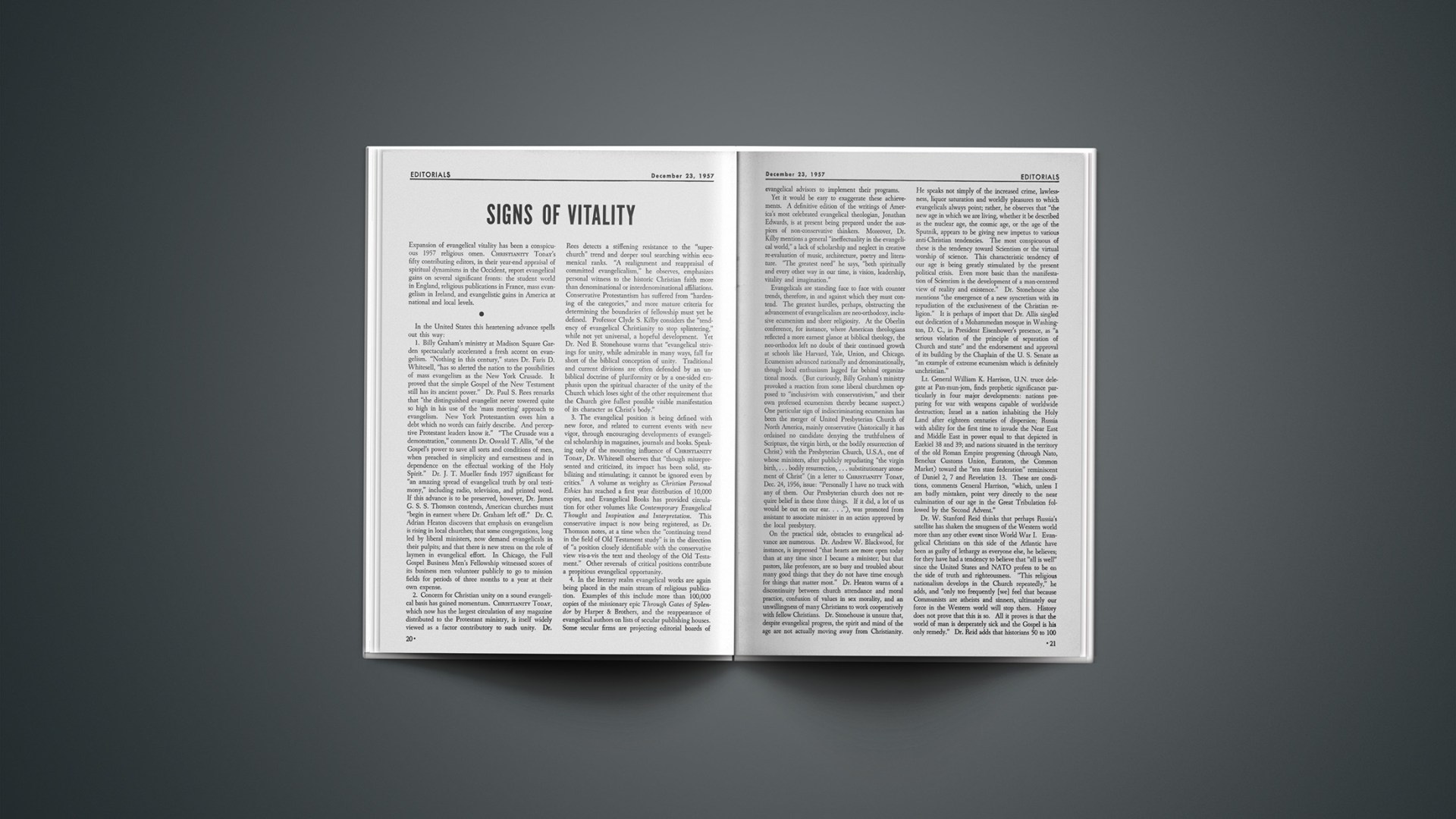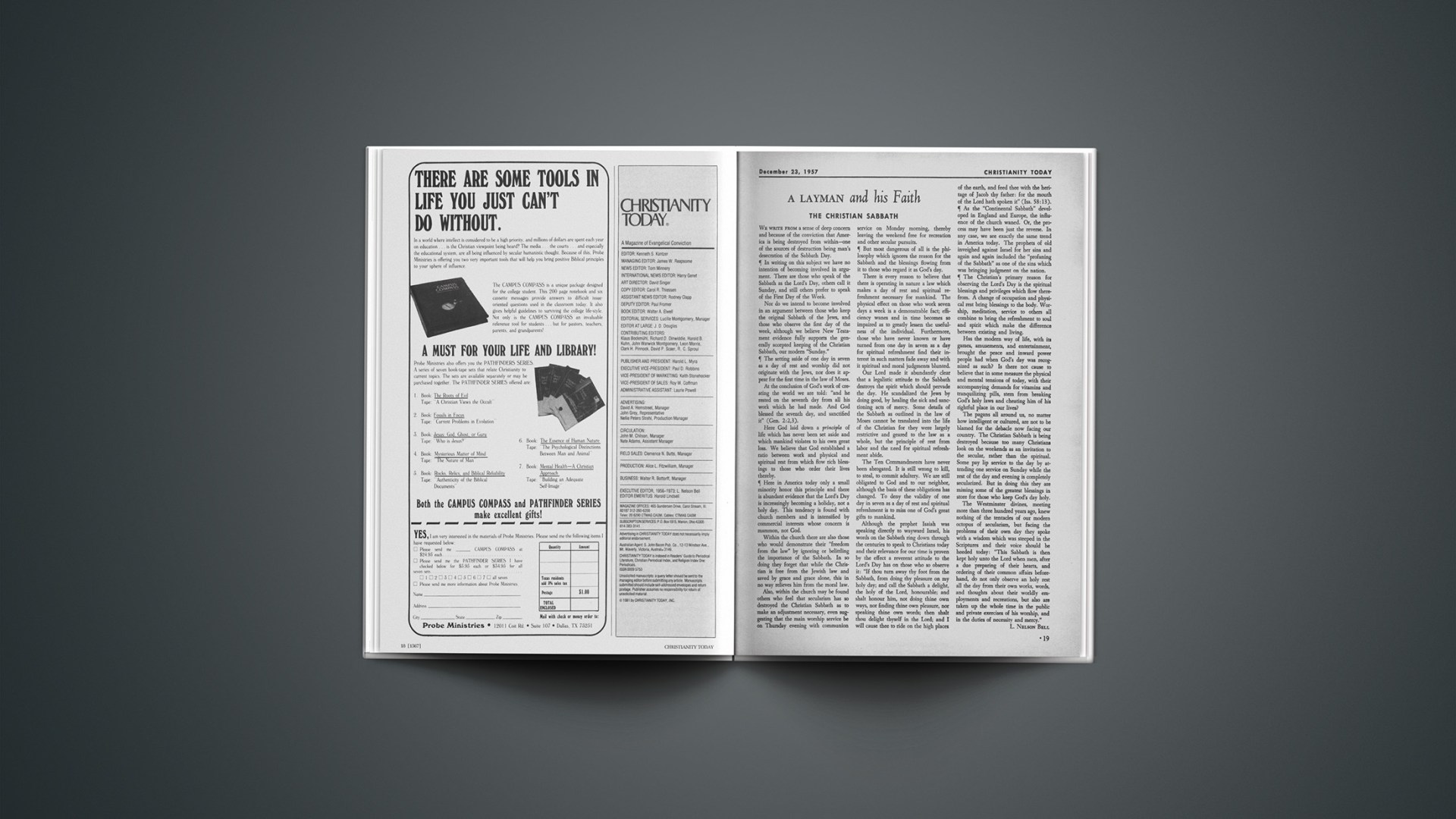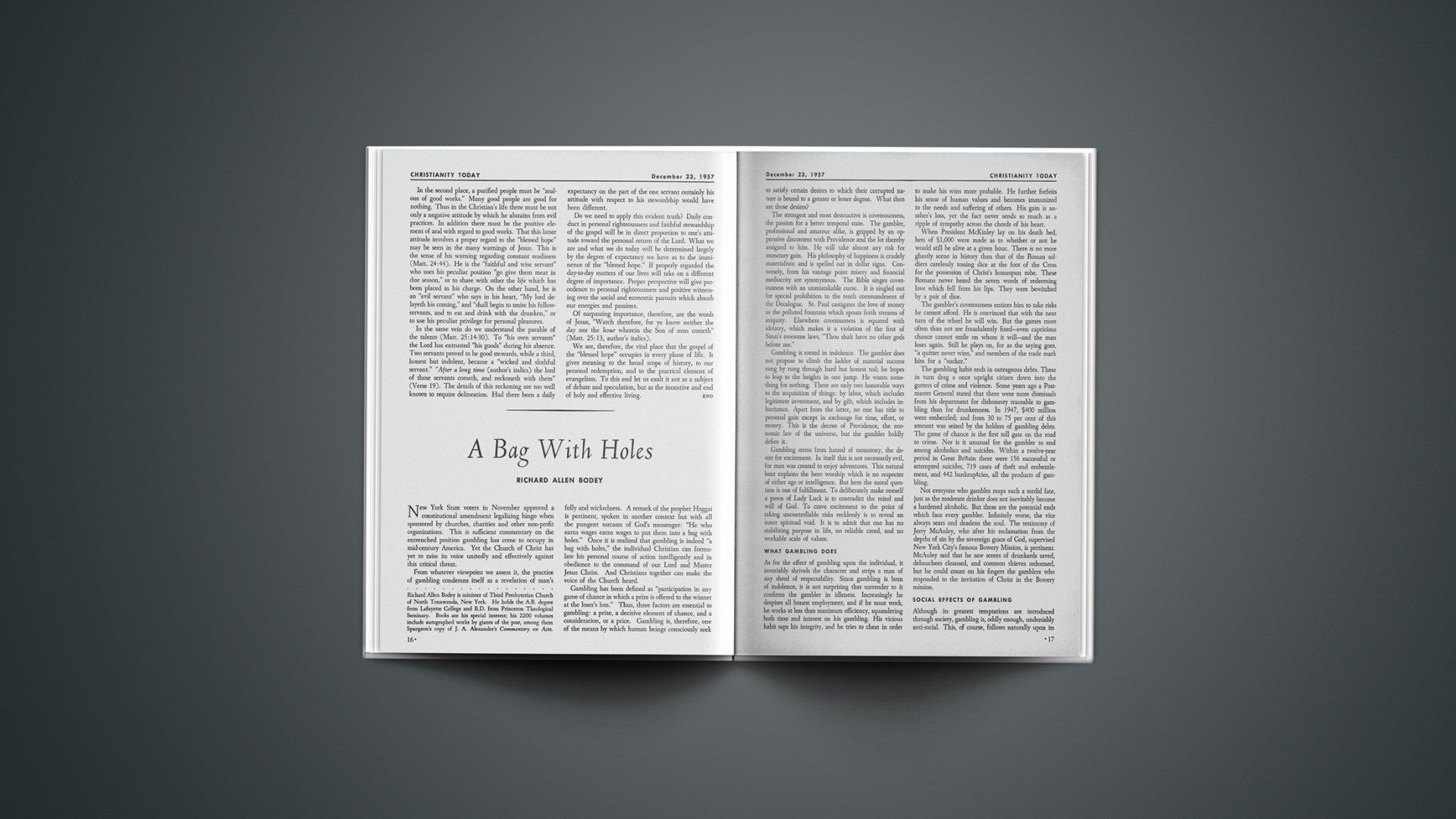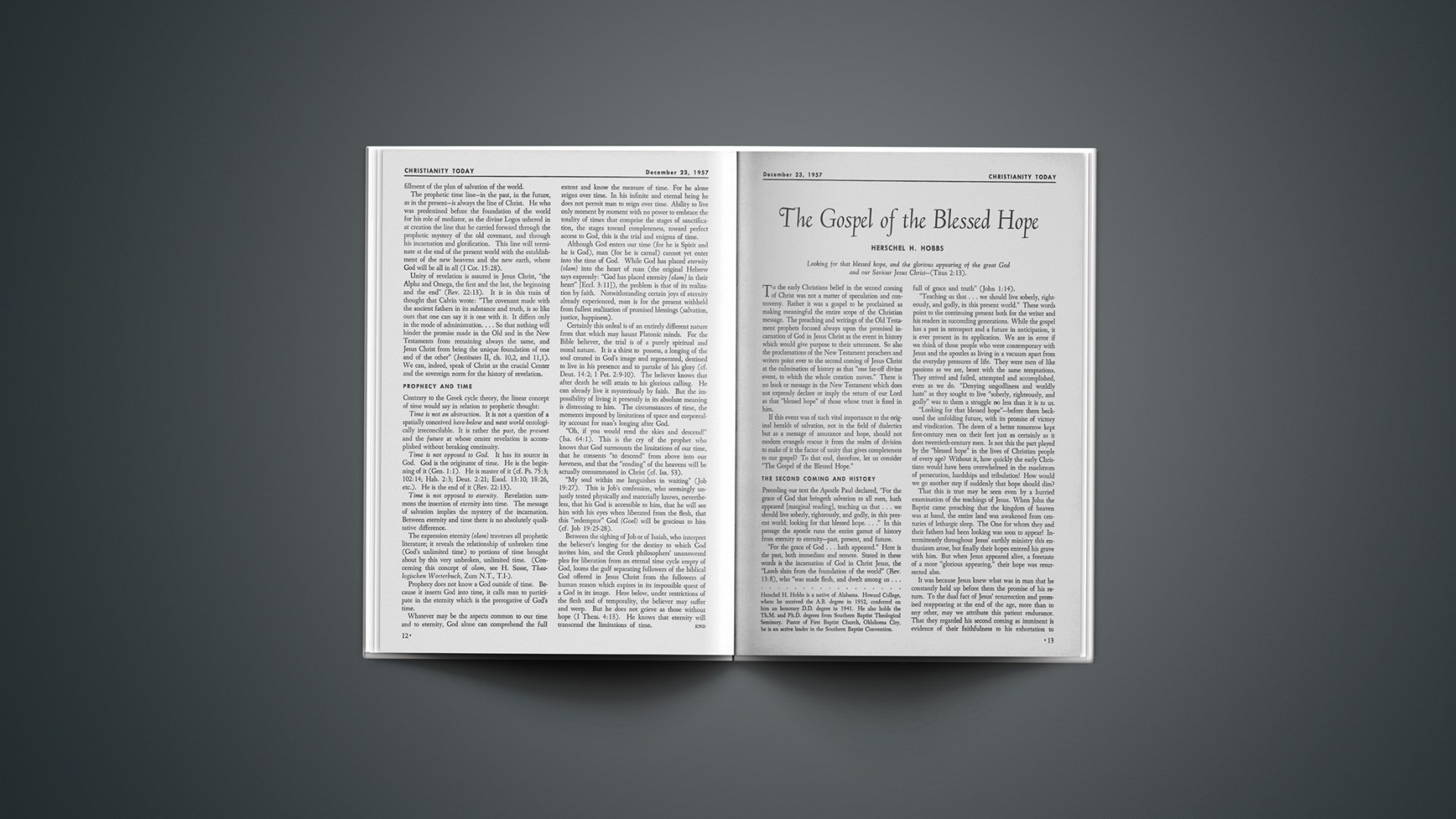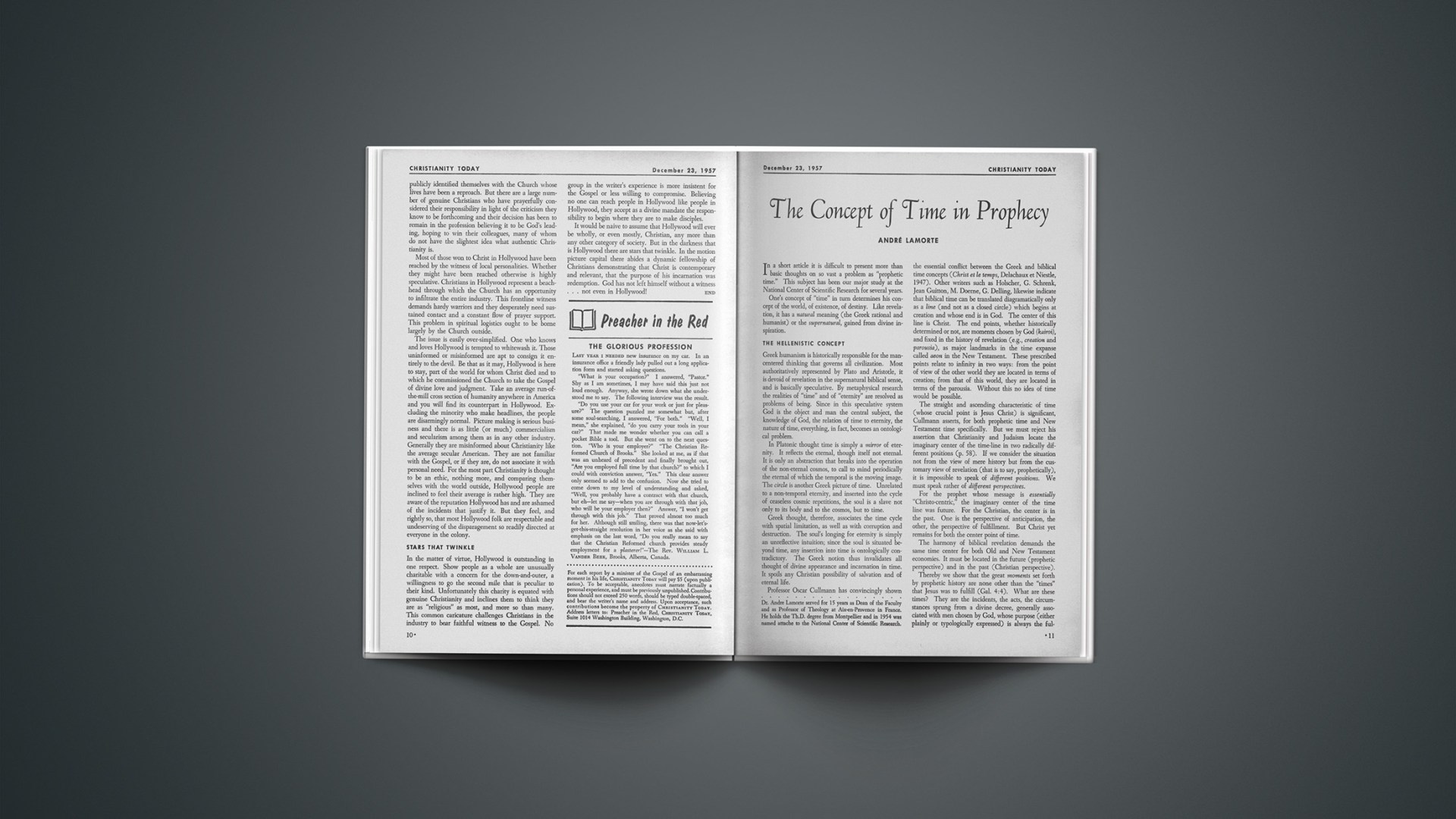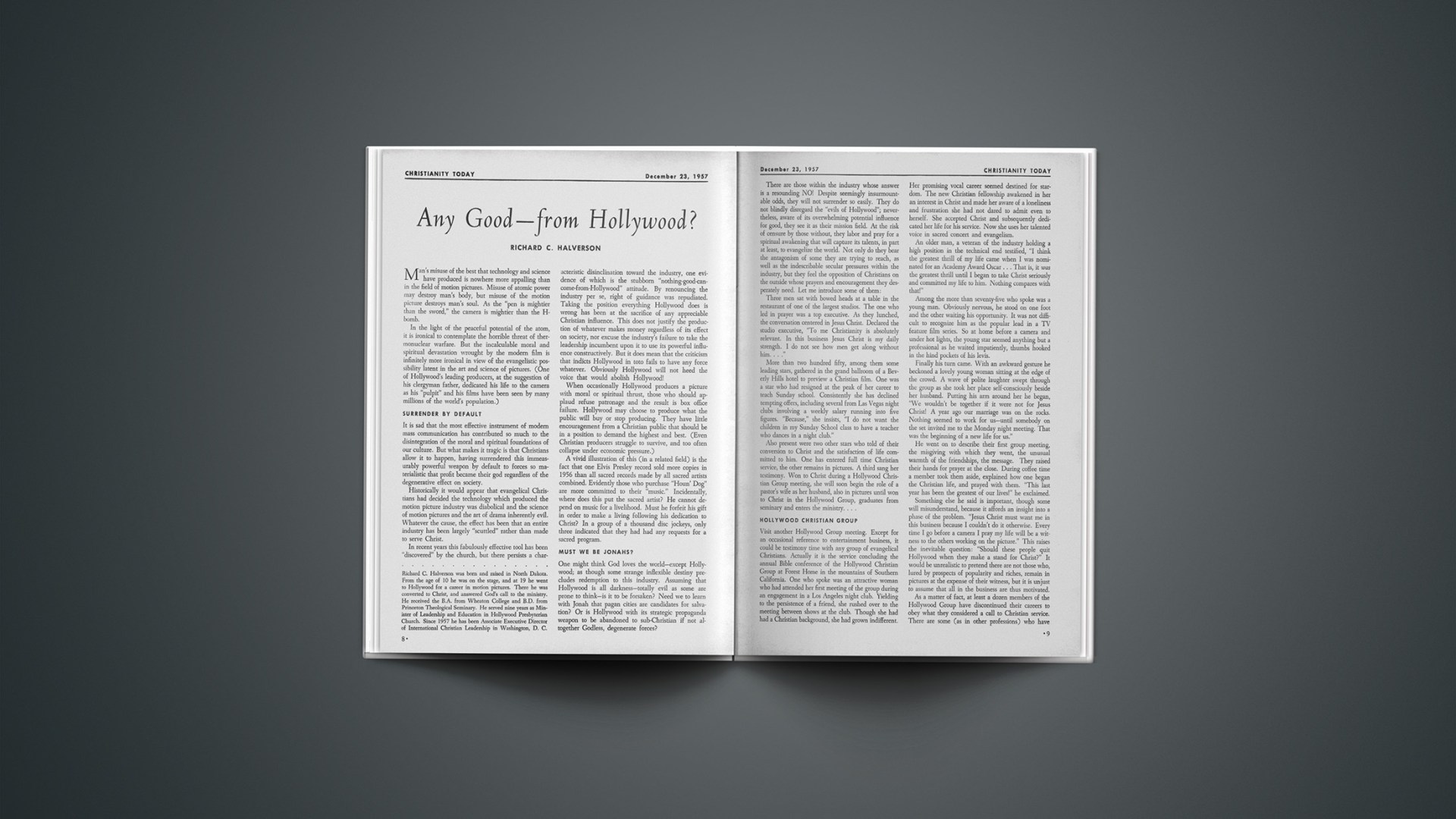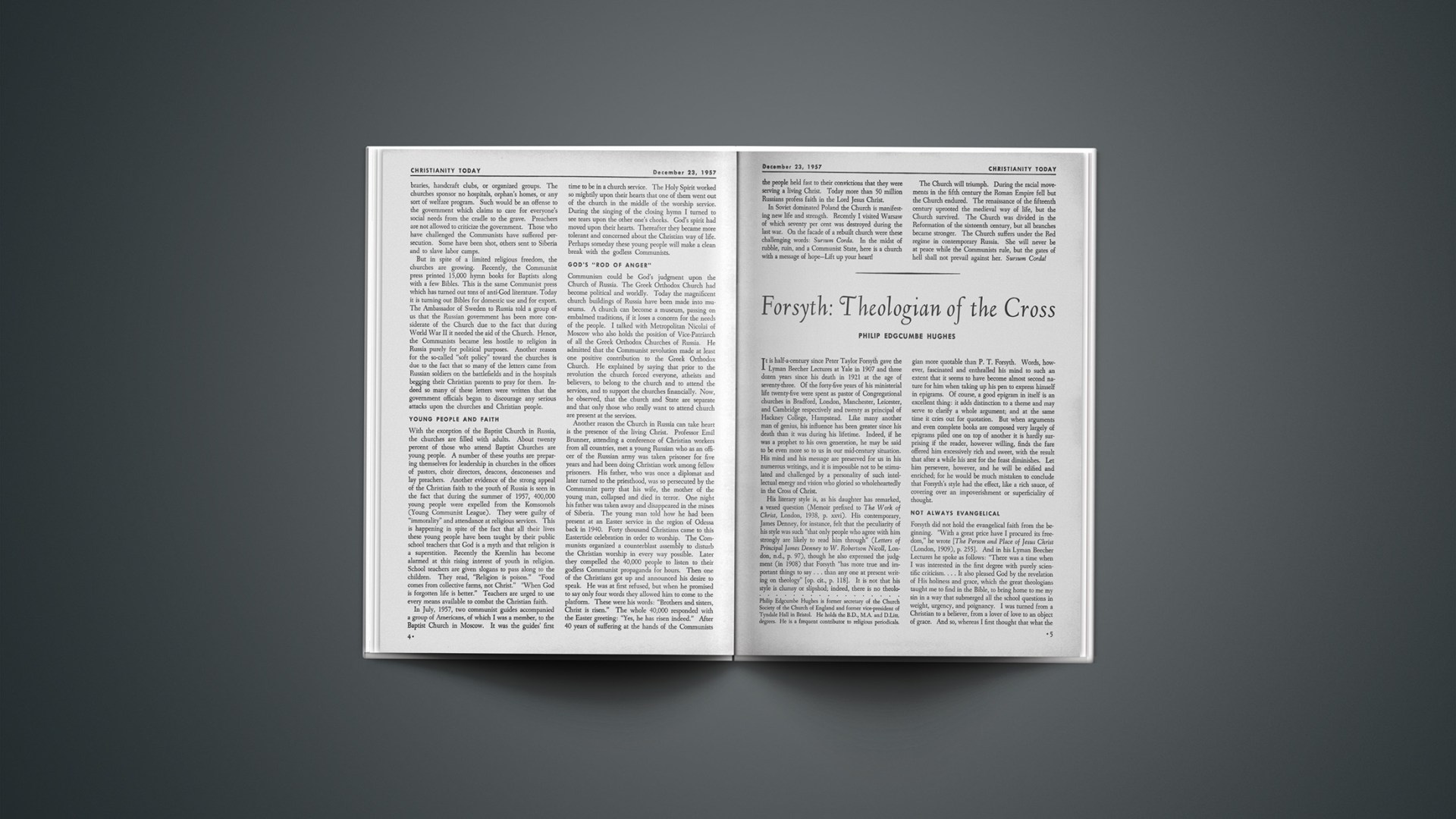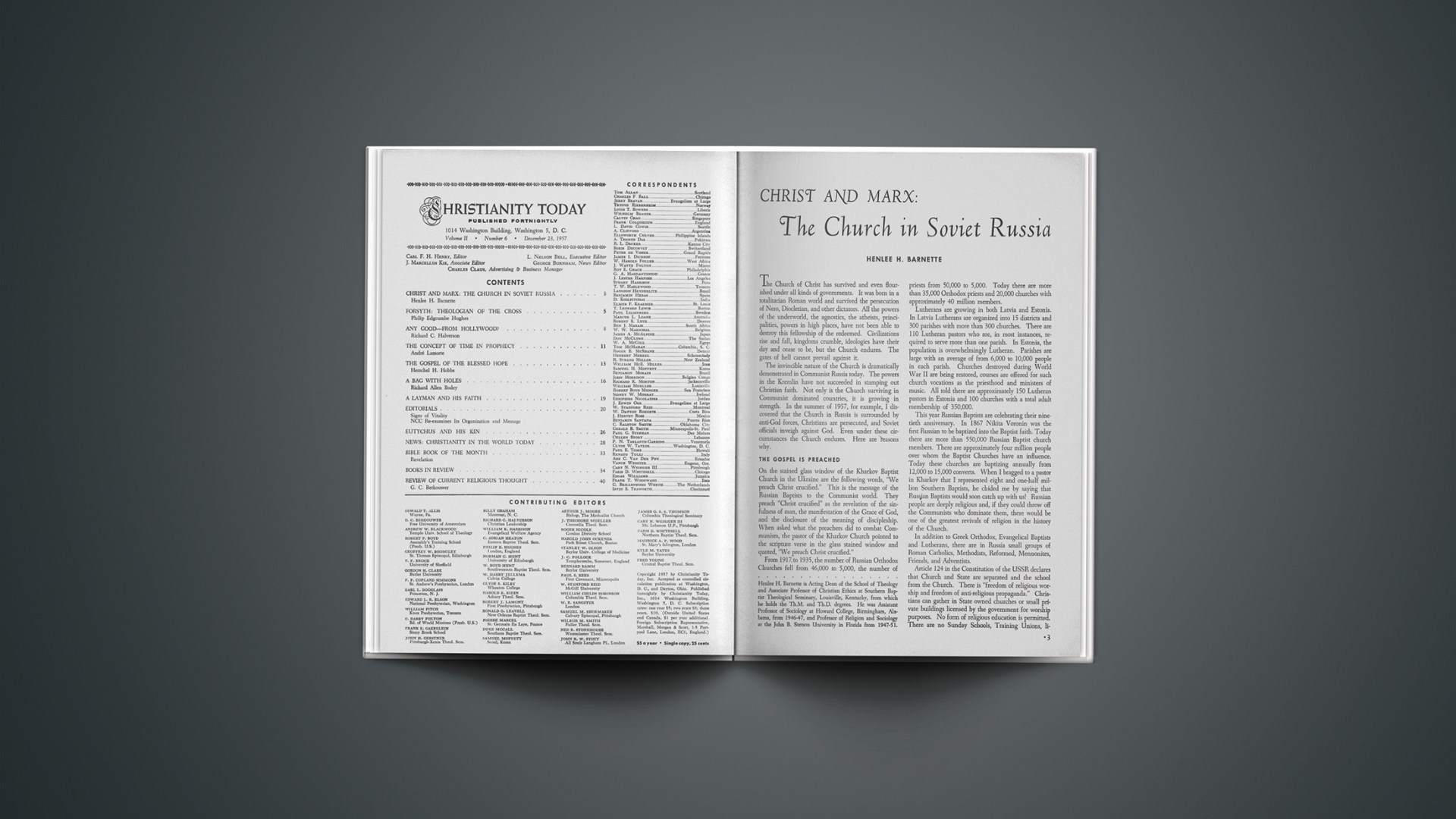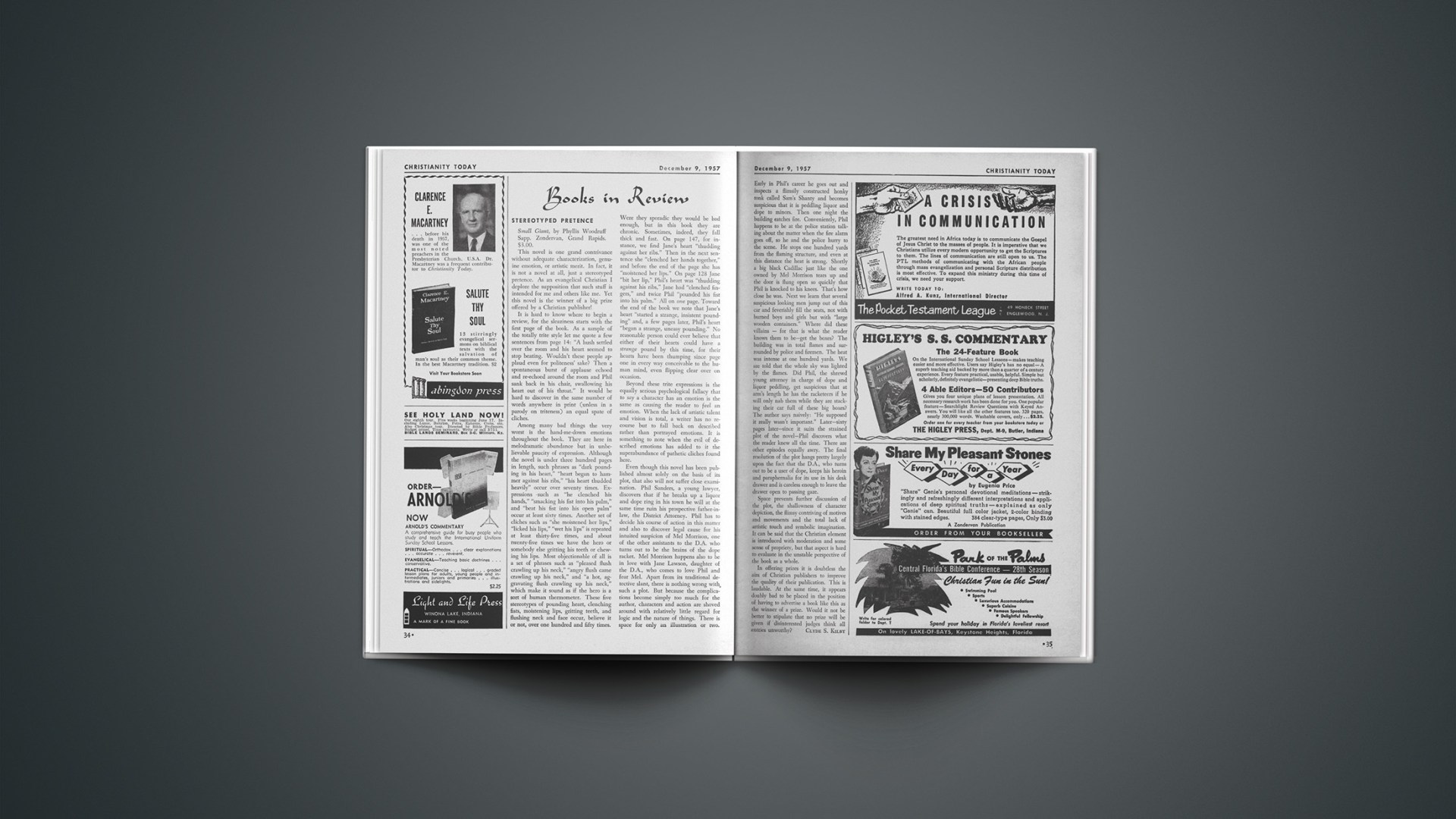Expansion of evangelical vitality has been a conspicuous 1957 religious omen. Christianity Today’s fifty contributing editors, in their year-end appraisal of spiritual dynamisms in the Occident, report evangelical gains on several significant fronts: the student world in England, religious publications in France, mass evangelism in Ireland, and evangelistic gains in America at national and local levels.
*
In the United States this heartening advance spells out this way:
1. Billy Graham’s ministry at Madison Square Garden spectacularly accelerated a fresh accent on evangelism. “Nothing in this century,” states Dr. Faris D. Whitesell, “has so alerted the nation to the possibilities of mass evangelism as the New York Crusade. It proved that the simple Gospel of the New Testament still has its ancient power.” Dr. Paul S. Rees remarks that “the distinguished evangelist never towered quite so high in his use of the ‘mass meeting’ approach to evangelism. New York Protestantism owes him a debt which no words can fairly describe. And perceptive Protestant leaders know it.” “The Crusade was a demonstration,” comments Dr. Oswald T. Allis, “of the Gospel’s power to save all sorts and conditions of men, when preached in simplicity and earnestness and in dependence on the effectual working of the Holy Spirit.” Dr. J. T. Mueller finds 1957 significant for “an amazing spread of evangelical truth by oral testimony,” including radio, television, and printed word. If this advance is to be preserved, however, Dr. James G. S. S. Thomson contends, American churches must “begin in earnest where Dr. Graham left off.” Dr. C. Adrian Heaton discovers that emphasis on evangelism is rising in local churches; that some congregations, long led by liberal ministers, now demand evangelicals in their pulpits; and that there is new stress on the role of laymen in evangelical effort. In Chicago, the Full Gospel Business Men’s Fellowship witnessed scores of its business men volunteer publicly to go to mission fields for periods of three months to a year at their own expense.
2. Concern for Christian unity on a sound evangelical basis has gained momentum. CHRISTIANITY TODAY, which now has the largest circulation of any magazine distributed to the Protestant ministry, is itself widely viewed as a factor contributory to such unity. Dr. Rees detects a stiffening resistance to the “super-church” trend and deeper soul searching within ecumenical ranks. “A realignment and reappraisal of committed evangelicalism,” he observes, emphasizes personal witness to the historic Christian faith more than denominational or interdenominational affiliations. Conservative Protestantism has suffered from “hardening of the categories,” and more mature criteria for determining the boundaries of fellowship must yet be defined. Professor Clyde S. Kilby considers the “tendency of evangelical Christianity to stop splintering,” while not yet universal, a hopeful development. Yet Dr. Ned B. Stonehouse warns that “evangelical strivings for unity, while admirable in many ways, fall far short of the biblical conception of unity. Traditional and current divisions are often defended by an unbiblical doctrine of pluriformity or by a one-sided emphasis upon the spiritual character of the unity of the Church which loses sight of the other requirement that the Church give fullest possible visible manifestation of its character as Christ’s body.”
3. The evangelical position is being defined with new force, and related to current events with new vigor, through encouraging developments of evangelical scholarship in magazines, journals and books. Speaking only of the mounting influence of CHRISTIANITY TODAY, Dr. Whitesell observes that “though misrepresented and criticized, its impact has been solid, stabilizing and stimulating; it cannot be ignored even by critics.” A volume as weighty as Christian Personal Ethics has reached a first year distribution of 10,000 copies, and Evangelical Books has provided circulation for other volumes like Contemporary Evangelical Thought and Inspiration and Interpretation. This conservative impact is now being registered, as Dr. Thomson notes, at a time when the “continuing trend in the field of Old Testament study” is in the direction of “a position closely identifiable with the conservative view vis-a-vis the text and theology of the Old Testament.” Other reversals of critical positions contribute a propitious evangelical opportunity.
4. In the literary realm evangelical works are again being placed in the main stream of religious publication. Examples of this include more than 100,000 copies of the missionary epic Through Gates of Splendor by Harper & Brothers, and the reappearance of evangelical authors on lists of secular publishing houses. Some secular firms are projecting editorial boards of evangelical advisors to implement their programs.
Yet it would be easy to exaggerate these achievements. A definitive edition of the writings of America’s most celebrated evangelical theologian, Jonathan Edwards, is at present being prepared under the auspices of non-conservative thinkers. Moreover, Dr. Kilby mentions a general “ineffectuality in the evangelical world,” a lack of scholarship and neglect in creative re-evaluation of music, architecture, poetry and literature. “The greatest need” he says, “both spiritually and every other way in our time, is vision, leadership, vitality and imagination.”
Evangelicals are standing face to face with counter trends, therefore, in and against which they must contend. The greatest hurdles, perhaps, obstructing the advancement of evangelicalism are neo-orthodoxy, inclusive ecumenism and sheer religiosity. At the Oberlin conference, for instance, where American theologians reflected a more earnest glance at biblical theology, the neo-orthodox left no doubt of their continued growth at schools like Harvard, Yale, Union, and Chicago. Ecumenism advanced nationally and denominationally, though local enthusiasm lagged far behind organizational moods. (But curiously, Billy Graham’s ministry provoked a reaction from some liberal churchmen opposed to “inclusivism with conservativism,” and their own professed ecumenism thereby became suspect.) One particular sign of indiscriminating ecumenism has been the merger of United Presbyterian Church of North America, mainly conservative (historically it has ordained no candidate denying the truthfulness of Scripture, the virgin birth, or the bodily resurrection of Christ) with the Presbyterian Church, U.S.A., one of whose ministers, after publicly repudiating “the virgin birth, … bodily resurrection, … substitutionary atonement of Christ” (in a letter to CHRISTIANITY TODAY, Dec. 24, 1956, issue: “Personally I have no truck with any of them. Our Presbyterian church does not require belief in these three things. If it did, a lot of us would be out on our ear.…”), was promoted from assistant to associate minister in an action approved by the local presbytery.
On the practical side, obstacles to evangelical advance are numerous. Dr. Andrew W. Blackwood, for instance, is impressed “that hearts are more open today than at any time since I became a minister; but that pastors, like professors, are so busy and troubled about many good things that they do not have time enough for things that matter most.” Dr. Heaton warns of a discontinuity between church attendance and moral practice, confusion of values in sex morality, and an unwillingness of many Christians to work cooperatively with fellow Christians. Dr. Stonehouse is unsure that, despite evangelical progress, the spirit and mind of the age are not actually moving away from Christianity. He speaks not simply of the increased crime, lawlessness, liquor saturation and worldly pleasures to which evangelicals always point; rather, he observes that “the new age in which we are living, whether it be described as the nuclear age, the cosmic age, or the age of the Sputnik, appears to be giving new impetus to various anti-Christian tendencies. The most conspicuous of these is the tendency toward Scientism or the virtual worship of science. This characteristic tendency of our age is being greatly stimulated by the present political crisis. Even more basic than the manifestation of Scientism is the development of a man-centered view of reality and existence.” Dr. Stonehouse also mentions “the emergence of a new syncretism with its repudiation of the exclusiveness of the Christian religion.” It is perhaps of import that Dr. Allis singled out dedication of a Mohammedan mosque in Washington, D. C., in President Eisenhower’s presence, as “a serious violation of the principle of separation of Church and state” and the endorsement and approval of its building by the Chaplain of the U. S. Senate as “an example of extreme ecumenism which is definitely unchristian.”
Lt. General William K. Harrison, U.N. truce delegate at Pan-mun-jom, finds prophetic significance particularly in four major developments: nations preparing for war with weapons capable of worldwide destruction; Israel as a nation inhabiting the Holy Land after eighteen centuries of dispersion; Russia with ability for the first time to invade the Near East and Middle East in power equal to that depicted in Ezekiel 38 and 39; and nations situated in the territory of the old Roman Empire progressing (through Nato, Benelux Customs Union, Euratom, the Common Market) toward the “ten state federation” reminiscent of Daniel 2, 7 and Revelation 13. These are conditions, comments General Harrison, “which, unless I am badly mistaken, point very directly to the near culmination of our age in the Great Tribulation followed by the Second Advent.”
Dr. W. Stanford Reid thinks that perhaps Russia’s satellite has shaken the smugness of the Western world more than any other event since World War I. Evangelical Christians on this side of the Atlantic have been as guilty of lethargy as everyone else, he believes; for they have had a tendency to believe that “all is well” since the United States and NATO profess to be on the side of truth and righteousness. “This religious nationalism develops in the Church repeatedly,” he adds, and “only too frequently [we] feel that because Communists are atheists and sinners, ultimately our force in the Western world will stop them. History does not prove that this is so. All it proves is that the world of man is desperately sick and the Gospel is his only remedy.” Dr. Reid adds that historians 50 to 100 years from now may be able to see “that the flight of Sputnik I drove the evangelicals back to the realization they were not to put their trust in man but in God alone.”
The feeling among CHRISTIANITY TODAY’S contributing editors is that American evangelicals have not yet addressed themselves adequately to the challenge of the age. And as they unify and advance as a movement, opposition from all sides becomes more formidable. The result is a period of delicate balance and cautious transition rather than of finality. Dr. Stonehouse exhorts: “If the evangelical cause is to make genuine progress in our times, we shall have to cast off our complacency and pride and take vigorous measures to renew our strength. In the first place, we dare not deceive ourselves with regard to our scholarship. Educational standards, at least in the United States, are shamefully low and Christian institutions have done far too little to elevate these standards.” There are hopeful signs, he believes, “that the present political crisis may stimulate the improvement of education as a whole, including that of Christian institutions, but there will be a greater challenge than ever to develop genuinely Christian education. In the second place,” he concludes, “my impression is that current evangelism, partly because of its tendency to be concerned exclusively with the salvation of individuals, often misses the God-centered character and cosmic scope of the biblical message of the coming Kingdom of God.”
Bishop Arthur J. Moore of the Methodist Church reminds us, however, that the Risen Christ is still at work in these tumultuous times. “It may be true that for the moment the general life of the world, amid the many confusions of our age, does not realize that from Jesus Christ must come the creative and directing spiritual energy necessary to sustain our race,” he comments. “But there are multitudes who believe we are soon to witness a great reassertion of Christ’s power to redeem human character and elevate human society. Christ emerges from a period of shattering change and fierce opposition without rival as the spiritual Inspirer and Redeemer the world so sorely needs. Supreme in suffering, he is supreme in understanding, supreme in his deity, supreme in his authority. He walks the broken roads of our time and lays his healing hand in power upon the world’s stricken heart.”
*
In Great Britain today, the spiritual pulse is fluctuating and uncertain. The Rev. W. E. Sangster of the Methodist Home Missions Department believes it still dubious that more than 10 percent of the people have any “vital link with the Church of God.” Agnosticism frequently expressed in British broadcasting and telecasting, plus logical positivism to which many younger philosophers are drifting, would suggest that the number of Christians is not increasing. And Dr. Sangster admits that he sees no early prospect of revival of religion. Religious societies at the universities are doing well, yet not equally well in all faculties. There is a need for fresh study of apologetics and philosophical theology, he feels, alongside the past quarter century’s rising interest in biblical theology.
Editor J. C. Pollock of The Churchman (Anglican) likewise observes, in retrospect, a rather indecisive past year. There has been uneasiness over the waste of manpower and money on side issues attacking symptoms rather than the roots of trouble, and over ministerial preoccupation in church routine at the expense of aggressive evangelism. The Church’s impact on national life, moreover, has been spoiled by a reputation for squabbling. Yet the moves toward church unity (Church of England and Church of Scotland and Church of North India), now being discussed, run the danger of marrying inward disunity with outward unity. All denominations are reflecting some concern for the work of expansion, given impetus by recent Graham crusades.
In Scotland, the past year has been disappointing in many respects. The “Tell Scotland” movement has lost much of its original impetus, and disputes and divisions are figuring more prominently in church life than positive endeavors. Well-filled churches in the suburbs do not mask general spiritual indifference of people in industrial and country areas. Christians are not praying, working, giving or witnessing with any sort of real sacrifice. For many of them a second Sunday service and a mid-week prayer meeting are too much to ask. This is perhaps the most depressing aspect of Scotland’s contemporary religious life, and undoubtedly the real key to the general climate of spiritual lethargy.
On the other hand, there are hopeful features. Dr. Geoffrey W. Bromiley, Rector of St. Thomas Episcopal Church, Edinburgh, has noted recently a significant advance of evangelical interest in colleges and universities. In the face of contemporary non-Christian or pseudo-Christian thought and practice, it may be many years before this new movement will take effect, but it augurs well for the future.
Somewhat in reaction to the expansion of evangelical influence, there is in Britain a continuance of sneers about “fundamentalists,” and this is contributory to growing opposition. The phrase “uncritical Fundamentalism” is being more and more applied to England’s historic evangelical position. In the York Convocation in May, the Bishop of Southwell, while courteously commending the zeal and pastoral faithfulness of evangelical clergy, made a direct attack on the conservative evangelical position within the Church of England, and Gabriel Hebert’s Fundamentalism and the Church follows the same bias.
Canon Law Revision, moreover, has tended to move toward legalizing High Church practices within the Established Church, which in the last century were condemned by the Privy Council Judicial Committee.
From the effects of the Graham crusade, most evangelical churches have been gaining rather than losing ground. Those which showed the most gain were in middle class areas, and some in working class vicinities where growing economic problems were leaving men and women more approachable and responsive to the Gospel than they had been previously. Both in the Church of England and in the historic Free churches there was an eagerness to learn from evangelicals the methods of pastoral evangelism and personal soul-winning. Even Ireland brought a favorable response to evangelical penetration there. The Dublin campaign by Eric Hutchings and the “Hour of Revival” team during October led to a civic reception where the Roman Catholic Lord Mayor voiced appreciation of the entire effort.
In many evangelical churches, however, there is such preoccupation with evangelism, with bringing people to conversion, that, in Dr. Philip E. Hughes’ words, “the essential task of building up believers by systematic instruction in the great doctrines of Holy Scripture is largely neglected, or is carried on at a superficial level. Christians are expected to exist on milk, without being permitted to develop a stomach for meat. The result is that, generally speaking, men and women of spiritual strength and stature are not being produced—and this is a serious matter for our cause. As we look forward to 1958, I would suggest that as evangelicals we must earnestly apply ourselves to the duty of systematically teaching the Word, from the pulpit and elsewhere, as well as preaching the Evangel. The two should never be divorced, if we are zealous to see much fruit brought to the Father’s glory.”
About the beginning of the year more than 500 Church of England clergy attended the first Clerical Conference of evangelical clergy at the restored Parish Church of Islington, of which Dr. Maurice A. P. Wood is vicar. The event was a revival of a conference founded 126 years ago by Bishop Daniel Wilson of Calcutta and first Metropolitan of the Church of India. Keswick Convention last July also proved to be larger than it had ever been before.
The Archbishop of Canterbury this October opened new buildings of London College of Divinity (formerly St. John’s Hall, Highbury, bombed during the war). This and every other evangelical theological college in the Church of England have in the past months become completely full, with a steady increase in evangelical candidates for ministry in the Church of England. At the Michaelmas ordination in St. Paul’s Cathedral, London, 22 of the 39 men who were ordained were evangelicals.
Student evangelism is reflecting fresh strides in Oxford and Cambridge through their largest religious societies, the Inter-Collegiate Christian Unions. The Reverend John Stott, Rector of All Souls, Langham Place, whose Sunday congregation is the largest of any in London, ministered to both campuses. At Cambridge’s “Freshers’ Weekend,” 450 students attended Bible study, and nearly 1000—seated in the chancel and aisles and standing at the back—came to the Sunday night evangelistic service. The eight-day Oxford mission, conducted by the Reverend Mr. Stott and 30 assistant missioners, saw the student attendance at services build from 500 to 900, with 120 definite commitments to Christ. This was on a campus whose philosophical atmosphere has not always been receptive to the Gospel.
*
For French-speaking countries (France, Belgium, Switzerland) the significant event this year in evangelical interest has been the decision to re-edit in French the Old and New Testament commentaries of John Calvin. The last edition of his New Testament commentaries was that of 1892 (Ed. Toulouse). And except for the Book of Psalms, edited in 1889, commentaries of the Old Testament have not been re-edited since 1564, the year of Calvin’s death. All French reissues since have been in Latin or in foreign languages. At present, churches, congregations and students alike are in prayer for funds necessary to reproduce this gigantic 25 volume edition.
*
Evangelical advance for the year 1957 has been slow and unsteady. This is a time of tension and trouble, and hostility to biblical conservatism is as evident in some circles as evangelical growth and penetration. Debate over the weakness of church life and Christian witness is still being waged on the surface of unresolved theological tensions dating from the 19th century. One of our most urgent tasks, therefore, to quote Dr. Bromiley, is “to work constructively for the end of these tensions; otherwise even a revived practice of religion might not be accompanied by true or lasting revival. A particular responsibility thus devolves upon evangelical theology to pass from negative resistance to positive leadership.” Steady development of gifted and germane evangelical literature in monograph, magazine, and textbook form is a responsibility for our day.
Evangelical exploits by spoken and written word have not lacked the spectacular in the year just completed. But we have no cause for respite, especially when men are turning to God with wistfulness and receptivity. The world today is more combustible than ever; the Bible saw its need a long time ago, and the Gospel is still the panacea for its ills. But for the toilsome task of personal rescue, the evangelical lifeline is not yet extended far enough; for the maturing of disciples, it is too much lacking in doctrinal content; and for the task of social renewal it is as often tangled by its friends as distrusted by its critics.
***
NCC Re-Examines its Organization and Message
A number of speeches and reports at the Fourth General Assembly of the National Council of Churches reflected realistic appraisal of the effectiveness of its program and a desire for greater theological content and depth. Since organizational efficiency must be judged finally by impact on church membership, and since in the absence of an adequate theology the Council would possess no vital message, this was a wholesome point of beginning.
Dr. Roy G. Ross, general secretary, admitted that most Americans, including members of churches, know little about the National Council and its role. Knowledge is limited largely to leaders of churches and their boards. Emphasizing this point, the Reverend Frederick Fox, special assistant on the White House staff, related that Congressmen are aware that the testimony of religious leaders did not always jibe with letters received from church members they profess to represent. The proud claim that the president of the NCC speaks on behalf of 37,000,000 church members therefore loses force. In a panel discussion Dr. Theodore A. Gill of The Christian Century remarked that the programs of the Division of Christian Education fail to reach the local church. Dr. Gerald E. Knoff, executive secretary of the division, acknowledged that he and other staff workers had been disillusioned for some time on that score. Yet programs are developed nonetheless and sent forth to indifferent and unresponsive churches.
No real attempt was made to analyze the cause for the ineffectiveness of the NCC programs. Doubtless one reason is that policies and programs are determined not by constituent churches but by a relatively small group of leaders—the General Board and staff members. In reality the NCC is not a council of churches but a council for churches. Member communions do not formulate policies and forward them to the Council for adoption and execution. Delegates and Board members are not instructed as to the mind of their particular churches in regard to important matters. A glance at the roll of delegates to the General Assembly or of Board members indicates that many are church board secretaries and few are pastors of average congregations and parishes. It has been stated that the General Board is largely dominated by ecclesiastics with expense accounts. Lay representatives are for the most part successful business and professional men and women. Average Christian volunteer workers—generally nearest to the needs and hearts of church members—are conspicuous by their absence. Because of its unrepresentative character the National Council is, for all practical purposes, far from the real life of the churches.
Several movements may isolate the Council further from actual church life. Continuity of elected Board members has been suggested. One report stated that “for the most intelligent and responsible actions by the Council it is exceedingly important that there be continuity, in reasonable measure, of elected General Board members.” However, this is a step towards a hierarchy, threatening a further divorce from local church life.
Some urge larger representation for local and state councils. But it is generally recognized that local councils do not exercise the real functions of the Church. Strangely enough, Dr. Truman B. Douglass scolds denominations for not entrusting the major church functions to the councils, asserting that the denominations are responsible “for making these councils symbols of religious and ethical triviality.” The triviality of many local councils is well known, but that is not the fault of the churches. Councils do not manifest the true marks of the Church such as the proper administration of sacraments, the preaching of the Gospel, and exercise of biblical discipline. Greater representation of local and state councils would in effect deny the name of National Council of Churches.
Another reason for ineffectiveness of the NCC programs has been the absence of theology. Here a change has now been promised. The past president of the NCC, Dr. Eugene Carson Blake, told the Assembly that “there has begun a process which I trust will grow and flower, viz: to examine theologically the whole Council movement and its various programs.” He illustrated this by “the practice of bringing to meetings of the General Board some of the great theological voices of our Churches: Niebuhr, Tillich, Calhoun. This to the end that the thought and discussions shall be deeply oriented in the best available insights into the nature of the Gospel itself.” This will hardly comfort and assure the many evangelicals within member churches who rather think that the best insight into the nature of the Gospel is to be found in the authoritative Scriptures. Perhaps of significance is the fact that theologians of denominational seminaries were unmentioned.
Reviewing the Gospel, the churches and the social scene through 50 years, Dr. Roswell P. Barnes disputed the adequacy of the social gospel as based on “somewhat romantic estimates of human nature and history.… What Rauschenbusch seems to have neglected and what our world needs desperately is an understanding of the cross, not only as an event in history, but also as a revelation of what is essential in history.” The doctrine of the Cross and the principle of redemption revealed by it seems to consist chiefly, in Dr. Barnes’ exposition, of sacrificial discipleship: “I do not presume to give an adequate definition. But for me it includes the voluntary giving of self and the yielding of self-advantage out of concern and compassion for the sin and suffering of others.” The biblical doctrine of Christ’s vicarious atonement was not mentioned. Seemingly the offense of the blood of the Cross has not ceased.
The same doctrine appeared in a message by Dr. Donald Black. He said, “The essence of the Christian message and the culmination of Christian ethic is in the cross. Its supreme example is the cross of Christ, and the supreme test for the Christian life is to experience the cross.… The essence of the cross is sacrificing life for those not worth it.” Contemporary preaching emphasizes that the Church must be the suffering servant that the undeserving world may be saved. This has been termed the extension of the atonement. This doctrine thrives today at the expense of the scriptural view that Christ suffered and died once and for all in behalf of doomed men—a doctrine not expounded at the Assembly.
The judgment and the sovereignty of God did receive emphasis, however. Dr. O. Frederick Nolde said, “God stands in judgment over all the nations of the world and all men have a share in the guilt for the plight in which the world finds itself.” In its official message to the churches and the nation, the Assembly warned, “We cannot be sure how much time is left to us, planning and working as men and women to whom every day is a day of judgment.”
But how is judgment to be averted and guilt removed? It seems to be by ethical endeavor: establishing freedom, justice, sympathetic understanding and good will, racial integration and the commitment of science to human betterment. There is subtle legalism in this suggested remedy—a justification and removal of guilt by good works. But the New Testament finds the solution in Christ and him crucified. Judgment is averted by accepting Christ as Saviour and Lord; good works are the fruit and evidence of genuine faith in Christ.
The Assembly waited expectantly to the last day for the message upon which a committee had worked for months and throughout the Assembly. This was to be a message of inspiration to the churches and of comfort to a fearful nation. But the message was disappointing. It pointed out the fact of a broken world and its sins. But, alas, that is all too obvious. The only hope expounded by the message was to point to our “oneness in Christ,” and it urged the Church to give witness of that oneness. That was the great thrust of the message. Far better had the Assembly echoed the message that “God so loved the world, that he gave his only begotten Son, that whosoever believeth in him should not perish, but have everlasting life. For God sent not his Son into the world to condemn the world; but that the world through him might be saved.”

